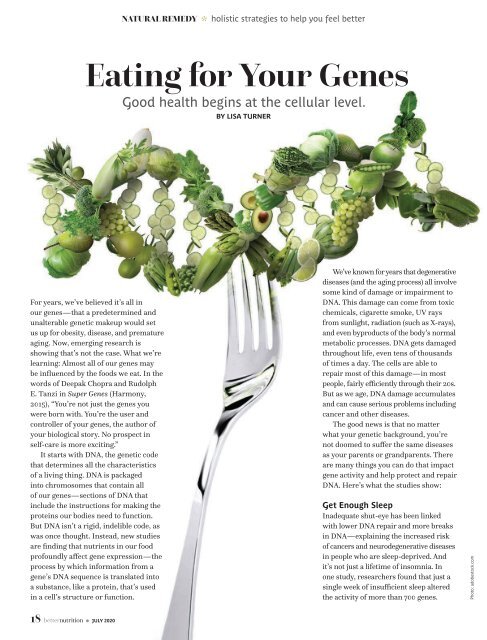Create successful ePaper yourself
Turn your PDF publications into a flip-book with our unique Google optimized e-Paper software.
NATURAL REMEDY *<br />
For years, we’ve believed it’s all in<br />
our genes—that a predetermined and<br />
unalterable genetic makeup would set<br />
us up for obesity, disease, and premature<br />
aging. Now, emerging research is<br />
showing that’s not the case. What we’re<br />
learning: Almost all of our genes may<br />
be influenced by the foods we eat. In the<br />
words of Deepak Chopra and Rudolph<br />
E. Tanzi in Super Genes (Harmony,<br />
2015), “You’re not just the genes you<br />
were born with. You’re the user and<br />
controller of your genes, the author of<br />
your biological story. No prospect in<br />
self-care is more exciting.”<br />
It starts with DNA, the genetic code<br />
that determines all the characteristics<br />
of a living thing. DNA is packaged<br />
into chromosomes that contain all<br />
of our genes—sections of DNA that<br />
include the instructions for making the<br />
proteins our bodies need to function.<br />
But DNA isn’t a rigid, indelible code, as<br />
was once thought. Instead, new studies<br />
are finding that nutrients in our food<br />
profoundly affect gene expression—the<br />
process by which information from a<br />
gene’s DNA sequence is translated into<br />
a substance, like a protein, that’s used<br />
in a cell’s structure or function.<br />
18 • JULY <strong>2020</strong><br />
holistic strategies to help you feel better<br />
Eating for Your Genes<br />
Good health begins at the cellular level.<br />
BY LISA TURNER<br />
We’ve known for years that degenerative<br />
diseases (and the aging process) all involve<br />
some kind of damage or impairment to<br />
DNA. This damage can come from toxic<br />
chemicals, cigarette smoke, UV rays<br />
from sunlight, radiation (such as X-rays),<br />
and even byproducts of the body’s normal<br />
metabolic processes. DNA gets damaged<br />
throughout life, even tens of thousands<br />
of times a day. The cells are able to<br />
repair most of this damage—in most<br />
people, fairly efficiently through their 20s.<br />
But as we age, DNA damage accumulates<br />
and can cause serious problems including<br />
cancer and other diseases.<br />
The good news is that no matter<br />
what your genetic background, you’re<br />
not doomed to suffer the same diseases<br />
as your parents or grandparents. There<br />
are many things you can do that impact<br />
gene activity and help protect and repair<br />
DNA. Here’s what the studies show:<br />
Get Enough Sleep<br />
Inadequate shut-eye has been linked<br />
with lower DNA repair and more breaks<br />
in DNA—explaining the increased risk<br />
of cancers and neurodegenerative diseases<br />
in people who are sleep-deprived. And<br />
it’s not just a lifetime of insomnia. In<br />
one study, researchers found that just a<br />
single week of insufficient sleep altered<br />
the activity of more than 700 genes.<br />
Photo: adobestock.com

















